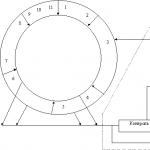What a purchasing manager should be able to do. What are the functions of a purchasing manager? Important information that a manager has
Almost no enterprise - manufacturing or trading - can do without them. They are necessary for the smooth operation of the entire company, and the supply manager is responsible for ensuring their availability. What are the professional responsibilities of this specialist?
The supply manager must ensure the availability of the necessary goods for sale, raw materials for production, materials for performing services.
In part, he can be a storekeeper, that is, he knows the state of warehouse supplies, keeps records of receipt and issue. However, in most modern enterprises, the purchasing manager is responsible not only for availability, but also for deliveries. It is he who must find reliable partners from whom the company will purchase goods or raw materials at affordable prices. He must be aware of the needs and performance of the enterprise. In some companies, the purchasing manager also performs the functions of a buyer (purchaser). That is, he not only looks for suppliers, but also conducts the entire procedure of material support for the enterprise, from calculating needs to managing the warehouse.
The supply plan is compiled individually depending on the industry and the number of personnel. At large enterprises there are several such specialists, each responsible for a specific group of goods. For example, one deals only with raw materials, the second deals with office materials. The third is responsible for household supplies: the availability of soap, cleaning products, tea, coffee, and

also household appliances. Accounting, warranty service, depreciation, inventory, write-off may also be part of his responsibilities.
The purchasing manager is also responsible for the supply of quality goods. That is, the procedures for complaints, handling defects, delays, and transport may also be part of his responsibilities. In addition, such a specialist must competently formalize any of his transactions: accept the invoice, pay (or transfer it to the accounting department for payment), submit a request, sign the order. The supply manager, whose responsibilities depend primarily on the industry and the scale of production or trade volumes, must constantly monitor the availability of goods in the warehouse. This function is especially important for industrial enterprises. Any downtime is a huge loss for the company. The purchasing manager must ensure the availability or uninterrupted supply of raw materials, as well as, for example, spare parts or consumables. Such a specialist maintains contacts with all departments - both with accounting and direct management, and with storekeepers. Outside the enterprise, this is one of the first persons who communicates with suppliers and contractors, therefore, it is extremely important that he is able to maintain good relationships and competently conduct negotiation.

If the company is engaged in imports, such a specialist may be required to know a foreign language and the principles of international transportation and
Knowledge of computer programs should not be limited to office applications. It is desirable that such a specialist be able to work with both accounting documents and transport documents. Purchasing manager is one of the key positions of the company. This specialist has a huge responsibility to ensure proper productivity of the enterprise.
I approve
_____________________________ (Last name, initials)
(name of organization, its ________________________________
organizational and legal form) (director; other person authorized
approve job description)
JOB DESCRIPTION FOR SUPPLY MANAGER
——————————————————————-
(name of institution)
00.00.201_g. №00
I. General provisions
1.1. This job description establishes the rights, responsibilities and job responsibilities of the supply manager _________________________________________ (hereinafter referred to as the “enterprise”). Name of institution
1.2. A purchasing manager is classified as a manager.
1.3. A person appointed to the position of supply manager must have a higher professional (economics or engineering-economics) education and work experience in the field of supply for at least ______ years.
1.4. Appointment to the position of supply manager and dismissal from it is carried out on the basis of an order upon presentation (; another official)
1.5. Sales Manager reports directly to
And who can count on a salary increase Mark Bershidsky According to a December study by Hays, 46% of employers plan to increase their staff next year. 45% say that they do not plan to increase their staff, but will only deal with... 
 Only every tenth employer is satisfied with the level of training provided by higher education in Russia. Companies need to start training personnel themselves, ceasing to rely on the state and universities. You can’t just become a specialist in demand on the market, although...
Only every tenth employer is satisfied with the level of training provided by higher education in Russia. Companies need to start training personnel themselves, ceasing to rely on the state and universities. You can’t just become a specialist in demand on the market, although...  Opinions of employers: which employees should be gotten rid of first? Representatives of Mail.Ru Group, Aviasales, Sports.ru and other companies explain. Anna Artamonova, Vice President of Mail.Ru Group First of all, you need to get rid of toxic employees....
Opinions of employers: which employees should be gotten rid of first? Representatives of Mail.Ru Group, Aviasales, Sports.ru and other companies explain. Anna Artamonova, Vice President of Mail.Ru Group First of all, you need to get rid of toxic employees....  Amazon recruiting manager Celeste Joy Diaz shares the biggest mistakes Amazon job seekers make. Google's top recruiters agree. They identified 3 types of resumes and advised which one is better. 1. Resume with positions. In this summary...
Amazon recruiting manager Celeste Joy Diaz shares the biggest mistakes Amazon job seekers make. Google's top recruiters agree. They identified 3 types of resumes and advised which one is better. 1. Resume with positions. In this summary... 
In the organizational and staffing structure of a supply unit, as a rule, there are three levels of managers - top, middle and lower. The results of an analysis of the organizational structures of Russian enterprises show that at the top level of supply management the job title most often used is head of the department (service) of material and technical supply, and less often - supply manager. The second name is more typical for middle management.
Giving a supply specialist the status of a manager, it is necessary to distinguish his responsibilities from the responsibilities of the top manager of the supply unit, leaving to the latter the management of the unit, the development of the main priority directions of the supply policy, the coordination of the activities of the structural units of the unit (warehouses, sectors (groups) of supply, forwarding, accounting, analysis , etc.).
The job description given below is aimed at a senior manager of a small company who resolves almost all supply issues, with the exception of issues of organizing warehousing and storage of material and technical resources. It can also be used as a basis when developing instructions for a mid-level purchasing manager.
In large companies, there is a division of management functions between managers of the supply department for certain types of material and technical assets or for solving certain supply problems. As a rule, agents with a clear procurement focus (agent for purchasing raw materials; an agent for purchasing components; an agent for purchasing equipment; etc.) report to a middle-level manager.
SUPPLY MANAGER'S INSTRUCTIONS
I. General provisions
1. The purchasing manager belongs to the category of managers.
2. A person with a higher professional (economic or engineering-economic) education and work experience in a specialty in the field of supply is appointed to the position of supply manager
3. The purchasing manager must know:
3.1. Legislative and regulatory legal acts, methodological materials on logistics of an enterprise.
3.2. Methods and procedures for long-term and current planning of supplying an enterprise with material and technical resources (raw materials, materials, semi-finished products, etc.).
3.3. The procedure for developing standards for production reserves and carrying out work on resource conservation.
3.4. Organization of logistics.
3.5. The procedure for concluding contracts with suppliers and monitoring their implementation.
3.6. Requirements for the preparation and execution of documentation for the release of material and technical assets to divisions of the enterprise.
3.7. Standards and technical conditions for material and technical support of product quality, methods and procedures for their development.
3.8. Wholesale and retail prices, range of consumed material and technical assets.
3.9. Fundamentals of technology, organization of production, labor and management.
3.10. Requirements for organizing accounting of supply operations and the procedure for reporting on the implementation of the logistics plan.
3.11. The procedure for preparing claims against suppliers for untimely or poor-quality fulfillment of the terms of concluded contracts.
3.12. Methods of information processing using modern technical means of communication and communications, computers.
3.13. Fundamentals of labor legislation.
3.14. Labor protection rules and regulations.
7. During the absence of the supply manager (business trip, vacation, illness, etc.), his duties are performed by a person appointed in the prescribed manner. This person acquires the corresponding rights and bears responsibility for the improper performance of the duties assigned to him.
II. Job responsibilities
Purchasing Manager:
1. Develops an enterprise policy on logistics issues.
2. Manages the development of projects of long-term, current plans and balances of material and technical support of the production program.
3. Participates in the calculation of production inventory standards based on determining the needs for material resources (raw materials, materials, semi-finished products, equipment, components, etc.).
4. Manages the development and implementation of programs for the continuous provision of the enterprise with the material and technical resources necessary for production.
5. Searches for suppliers, focusing on the quality of the proposed material and technical resources, price, delivery time, favorable delivery conditions.
6. Develops relationships with suppliers, analyzes their production and financial capabilities, studies the possibility and feasibility of establishing direct long-term economic relations for the supply of material and technical resources.
7. Prepares and corrects pre-contractual documentation.
8. Conducts negotiations with suppliers in order to place orders and agree on terms and conditions of delivery.
9. Concludes contracts with suppliers.
10. Organizes the study of operational marketing information and advertising materials about the offers of small wholesale sellers and wholesale fairs in order to identify the possibility of purchasing material and technical resources through wholesale trade, as well as purchasing material and technical resources sold on a free sale basis.
11. Ensures the delivery of material resources from suppliers and sellers in accordance with the terms and conditions stipulated in the contracts.
12. Organizes the processing of supplies of material and technical resources (acceptance by quantity and completeness, quality identification, preparation of the necessary acceptance documentation, internal movement to storage areas or production units of the enterprise).
13. Prepares claims against suppliers in case of violation of contractual obligations, controls the preparation of settlements for these claims, and coordinates with suppliers changes in the terms of concluded contracts.
14. Periodically evaluates the terms of existing contracts for the quality of fulfillment of obligations by suppliers in order to make decisions on finding new suppliers and changing schemes for working with suppliers.
15. Organizes control over the state of inventories of material and technical resources, operational regulation of production inventories at the enterprise, compliance with limits on the supply of material resources and their expenditure in the divisions of the enterprise for their intended purpose.
16. Manages the development and implementation of measures for:
Increasing the efficiency of use of material and technical resources;
Reducing costs associated with transportation and storage of material and technical resources;
Improving the system of control over the consumption of material and technical resources;
Identification and sale of surplus material and technical resources.
17. Develops proposals for replacing expensive material and technical resources with more affordable ones in terms of price and acquisition capabilities, but at the same time precisely meeting quality requirements.
18. Develops and implements programs for:
Reducing investment in inventories of material and technical resources by improving planning and selection of suppliers;
Improving the quality of purchased material and technical resources;
Reducing the raw material component of the cost of products manufactured by the enterprise.
19. Coordinates the development and maintenance of procurement databases containing operational information necessary to determine the needs for material and technical resources, sources of their purchases, procurement costs, etc.
20. Organizes the compilation of:
Applications for material and technical resources (consolidated annual, annual, quarterly, monthly);
Acts, conclusions on the quality of incoming material and technical resources;
- _____________________________________________________________________.
21. Develops tasks for subordinate employees and monitors their implementation.
III. Rights
The supply manager has the right:
1. Independently determine the forms of relationships with suppliers of material and technical resources.
2. Sign and endorse documents within your competence.
3. Request personally or on behalf of the immediate supervisor from the heads of departments of the enterprise and specialists for information and documents necessary to fulfill their official duties.
4. Get acquainted with the documents defining his rights and responsibilities for his position, criteria for assessing the quality of performance of official duties.
5. Submit proposals for improvement of work related to the responsibilities provided for in these instructions for consideration by management.
6. Require the management of the enterprise to provide organizational and technical conditions and prepare the established documents necessary for the performance of official duties.
IV. Responsibility
The Purchasing Manager is responsible for:
1. For improper performance or failure to fulfill one’s job duties provided for in this job description - within the limits established by the current labor legislation of the Russian Federation.
2. For offenses committed in the course of their activities - within the limits established by the current administrative, criminal and civil legislation of the Russian Federation.
3. For causing material damage to the organization - within the limits established by the current labor and civil legislation of the Russian Federation.
I APPROVED |
|||||||
|
(name of enterprise, organization, institution) |
(head of an enterprise, organization, institution) |
||||||
JOB DESCRIPTION |
|||||||
|
00.00.0000 |
№ 00 |
(signature) |
(FULL NAME.) |
||||
|
Structural subdivision: |
Logistics Department |
||||||
|
Job title: |
Purchasing Manager |
||||||
|
00.00.0000 |
|||||||
- General provisions
This job description defines the functional duties, rights and responsibilities of the supply manager.
A purchasing manager is classified as a manager.
The supply manager is appointed and dismissed in accordance with the procedure established by the current labor legislation by order of the director of the enterprise upon the recommendation of the commercial director and in agreement with the head of the departmentlogistics (hereinafter referred to as MTS).
Relationships by position:
|
1.4.1 |
Direct subordination |
head of department MTS |
|
1.4.2. |
Additional Subordination |
commercial director |
|
1.4.3 |
Gives orders |
subordinate employees |
|
1.4.4 |
The employee is replaced |
person appointed by the director of the enterprise |
|
1.4.5 |
The employee replaces |
- Purchasing Manager Qualifications:
|
2.1. |
Education |
higher professional (economics or engineering-economics) |
|
experience |
work experience in the specialty in the field of supply for at least (3 years, etc.) years. |
|
|
knowledge |
Legislative and regulatory legal acts, methodological materials on logistics of an enterprise. Methods and procedures for long-term and current planning of supplying an enterprise with material and technical resources (raw materials, materials, semi-finished products, etc.). The procedure for developing standards for production reserves and carrying out work on resource conservation. Organization of logistics. The procedure for concluding contracts with suppliers and monitoring their implementation. Requirements for the preparation and execution of documentation for the release of material and technical assets to divisions of the enterprise. Standards and technical conditions for material and technical support of product quality, methods and procedures for their development. Wholesale and retail prices, range of consumed material and technical assets. Fundamentals of technology, organization of production, labor and management. Requirements for organizing accounting of supply operations and the procedure for reporting on the implementation of the logistics plan. The procedure for preparing claims against suppliers for untimely or poor-quality fulfillment of the terms of concluded contracts. Methods of information processing using modern technical means of communication and communications, computers. Fundamentals of labor legislation. Labor protection rules and regulations. |
|
|
skills |
||
|
Additional requirements |
- Documents regulating the activities of a supply manager
3.1 External documents:
Legislative and regulatory acts relating to the work performed.
3.2 Internal documents:
Charter of the enterprise, Orders and instructions of the director of the enterprise (head of department MTS ); Regulations on the MTS department, Job description of the supply manager, Internal labor regulations.
- Responsibilities of a Purchasing Manager
Purchasing Manager:
4.1. Develops enterprise policy on logistics issues.
4.2. Manages the development of projects for long-term, current plans and balances of material and technical support for the production program.
4.3. Participates in the calculation of production inventory standards based on determining the needs for material resources (raw materials, materials, semi-finished products, equipment, components, etc.).
4.4. Manages the development and implementation of programs to continuously provide the enterprise with the material and technical resources necessary for production.
4.5. Searches for suppliers, focusing on the quality of the proposed material and technical resources, price, delivery time, favorable delivery conditions.
4.6. Develops relationships with suppliers, analyzes their production and financial capabilities, studies the possibility and feasibility of establishing direct long-term economic relations for the supply of material and technical resources.
4.7. Prepares and corrects pre-contractual documentation.
4.8. Conducts negotiations with suppliers to place orders and agree on delivery terms and conditions.
4.9. Concludes contracts with suppliers.
4.10. Organizes the study of operational marketing information and advertising materials about the offers of small-scale wholesalers and wholesale fairs in order to identify the possibility of purchasing material and technical resources through wholesale trade, as well as purchasing material and technical resources sold on a free sale basis.
4.11. Ensures the delivery of material resources from suppliers and sellers in accordance with the terms and conditions stipulated in the contracts.
4.12. Organizes the processing of supplies of material and technical resources (acceptance by quantity and completeness, quality identification, preparation of the necessary acceptance documentation, internal movement to storage areas or production units of the enterprise).
4.13. Prepares claims against suppliers in case of violation of contractual obligations, controls the preparation of settlements for these claims, and coordinates with suppliers changes in the terms of concluded contracts.
4.14. Periodically evaluates the terms of existing contracts for the quality of fulfillment of obligations by suppliers in order to make decisions on finding new suppliers and changing schemes for working with suppliers.
4.15. Organizes control over the state of inventories of material and technical resources, operational regulation of production inventories at the enterprise, compliance with limits on the supply of material resources and their expenditure in the divisions of the enterprise for their intended purpose.
4.16. Manages the development and implementation of activities for:
— increasing the efficiency of using material and technical resources;
— reducing costs associated with transportation and storage of material and technical resources;
— improving the system of control over the consumption of material and technical resources;
— identification and sale of surplus material and technical resources.
4.17. Develops proposals for replacing expensive material and technical resources with more affordable ones in terms of price and acquisition capabilities, but at the same time precisely meeting quality requirements.
4.18. Develops and implements programs for:
— reducing investment in inventories of material and technical resources by improving planning and selection of suppliers;
— improving the quality of purchased material and technical resources;
— reduction of the raw material component of the cost of products manufactured by the enterprise.
4.19. Coordinates the development and maintenance of procurement databases containing operational information necessary to determine the needs for material and technical resources, sources of procurement, procurement costs, etc.
4.20. Organizes the compilation of:
— requests for material and technical resources (consolidated annual, annual, quarterly, monthly);
— acts, conclusions on the quality of incoming material and technical resources;
4.21. Develops tasks for subordinate employees and monitors their implementation.
- Purchasing manager rights
The supply manager has the right:
5.1. Independently determine the forms of relationships with suppliers of material and technical resources.
5.2. Sign and endorse documents within your competence.
5.3. Request personally or on behalf of the immediate supervisor from heads of departments of the enterprise and specialists information and documents necessary to perform their job duties.
5.4. Get acquainted with the documents defining his rights and responsibilities for his position, criteria for assessing the quality of performance of official duties.
5.5. Submit proposals for improvement of work related to the responsibilities provided for in these instructions for consideration by management.
5.6. Require the management of the enterprise to provide organizational and technical conditions and prepare the established documents necessary for the performance of official duties.
- Responsibilities of the Purchasing Manager
Purchasing Manageris responsible:
6.1. For improper performance or failure to fulfill one’s job duties as provided for in this job description - within the limits determined by the current labor legislation of Ukraine.
Job Description for Supply Manager
1. General Provisions
1. This job description defines the job duties, rights and responsibilities of the supply manager.
2. A person with a higher professional education (in the specialty of management) or higher professional education and additional training in the field of management, with at least 2 years of work experience in the specialty, is appointed to the position of supply manager.
3. The supply manager must know the laws and regulations governing business and commercial activities; market economy, entrepreneurship and doing business; market conditions, pricing procedures, taxation, marketing fundamentals; organization of logistics and warehousing; the procedure for concluding contracts with suppliers and monitoring their implementation, drawing up documentation for the release of materials to the divisions of the enterprise; quality standards and storage conditions for goods; wholesale and retail prices, range of purchased goods; organization of accounting of supply and warehouse operations; reporting procedure; theory of management, macro- and microeconomics, business administration, insurance, banking and finance; theory and practice of working with personnel; forms and methods of conducting advertising campaigns; the procedure for developing business plans and commercial terms of agreements, agreements, contracts; fundamentals of sociology, psychology and labor motivation; ethics of business communication; enterprise management structure, prospects for innovation and investment activities; basics of office work; methods of information processing using modern technical means, communications and communications, computer technology; basics of labor legislation; advanced domestic and foreign experience in the field of supply, logistics, management; rules and regulations of labor protection.
4. The supply manager is appointed and dismissed by order of the head of the enterprise in accordance with the current legislation of the Russian Federation.
5. The supply manager reports directly to the head of the enterprise, or his deputy, or the head of a structural unit.
2. Job responsibilities
Planning, organization and control of the supply of the enterprise with material resources of the required quality. Increasing the work motivation of subordinates (if any). Development of proposals for the rational use of material resources in order to reduce production costs and obtain maximum profits. Reducing supply overhead costs. Participation in the development of draft long-term and current plans, balances of material and technical support of production, repair and maintenance needs of the organization and its divisions, creation of the necessary reserves based on determining the need for material resources using progressive forms of planning. Preparation of contracts with suppliers, coordination of terms and conditions of deliveries, study of the possibility and feasibility of establishing direct long-term economic relations for the supply of material and technical resources. Study of operational marketing information and advertising materials. Ensuring the delivery of material resources in accordance with the terms stipulated in the contracts, monitoring their quantity, quality and completeness, organizing their storage in the organization’s warehouses. Preparing claims against suppliers in case of violation of contractual obligations, monitoring the preparation of settlements for these claims, agreeing with suppliers on changes to the terms of concluded contracts. Development of organizational standards for logistics, economically sound standards for warehouse stocks of material resources. Organization of warehouse operations, monitoring compliance with necessary storage conditions. Mechanization and automation of transport and warehouse operations. Accounting for the movement of material resources in the organization’s warehouses, participation in the inventory of material assets. Preparation of established reports. Carrying out other functions within one’s competence in accordance with the goals and objectives of the enterprise.
3. Rights
The supply manager has the right:
1. give orders that are mandatory for execution by employees subordinate to him;
2. participate in the selection and placement of personnel for their activities;
3. make proposals to management for encouraging and imposing penalties on employees of the enterprise in their activities;
4. make proposals for the development and improvement of the enterprise’s activities;
5. request from management, receive and use information materials and regulatory documents necessary to perform their official duties;
6. take part in meetings at which issues related to his work are discussed;
7. undergo certification in the prescribed manner with the right to receive the appropriate qualification category;
8. improve your skills.
The supply manager enjoys all labor rights in accordance with the Labor Code of the Russian Federation.
4. Responsibility
The Purchasing Manager is responsible for:
9. implementation of official duties assigned to him;
10. organization of its work, timely and qualified execution of orders, instructions and instructions from senior management, regulations on its activities;
11. rational and efficient use of material, financial and human resources;
12. compliance with internal regulations, sanitary and anti-epidemic regime, fire safety and safety regulations;
13. maintaining documentation required by job responsibilities;
14. provision of statistical and other information on its activities in the prescribed manner;
15. observance of labor discipline and performance of official duties by employees subordinate to him;
16. readiness to work in emergency situations.
For violation of regulations, the supply manager may be subject to disciplinary, material, administrative and criminal liability in accordance with current legislation, depending on the severity of the offense.






